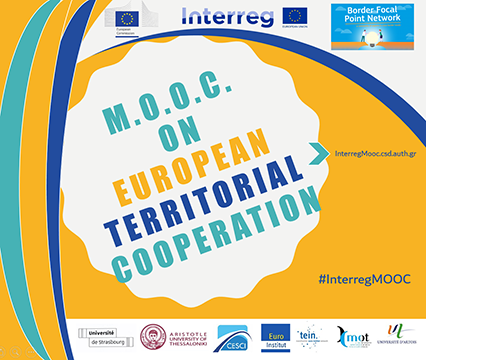Interested in discovering the history of European territorial cooperation (Interreg)? Would you like to learn more about the key considerations which led to the creation of Interreg while keeping abreast of the very latest developments in this key European initiative?
- 18 February 2022

Then join us from 7 March to 24 April!
The European Commission, in conjunction with a consortium led by the University of Strasbourg is delighted to announce the launch of a new Massive Open Online Course (MOOC) on European Territorial Cooperation (Interreg). This cooperation tool represents a key European framework for mutual cooperation both between Member States of the European Union and between the European Union and third countries.
The course aims to present a general overview of territorial cooperation in Europe. It is divided into four sections:
- The first section deals with the foundations and the general framework of Interreg by questioning the origins, the evolution and the theoretical framework of territorial cooperation as it has developed in Europe since the end of the Second World War. Participants will apprehend the historical context of the origins of territorial cooperation in Europe.
- A second section presents the existing European policies in the field of territorial cooperation: Interreg, Neighborhood Policy, Macro-regional Policy, etc., with a view to analysing decision-making procedures, implementation, spaces and impacts.
- In the third section, a thematic approach is proposed. For each of 5 identified policy areas (health, special planning, environment, culture, mobility), the aim is to assess how Interreg has helped to shape the implementation of these policies. The issue of multi-level-governance is also explored as MOOC participants learn from first-hand real life experience how the different stakeholders intervene and interact.
- Finally, a fourth section will evaluate how territorial cooperation is concretely practised by actors on the ground, the difficulties they encounter and the methods deployed to resolve these difficulties and challenges. The aim of this section is to introduce the basics of project management and provide participants with a series of tools, which will enable them to develop and implement cross-border projects more efficiently. This final section also examines whether Interreg provides real added value in the European cross-border territories where it takes place.
This MOOC is targeted at:
- The academic community (e.g. students and teachers);
- Practitioners of territorial cooperation (e.g. interreg programmes; projects);
- Individuals and organisations located in border regions who wish to promote the development of cross-border cooperation;
- Any member of the public who is interested in European integration and who wishes to acquire knowledge about Interreg.
Registrations are now open.
